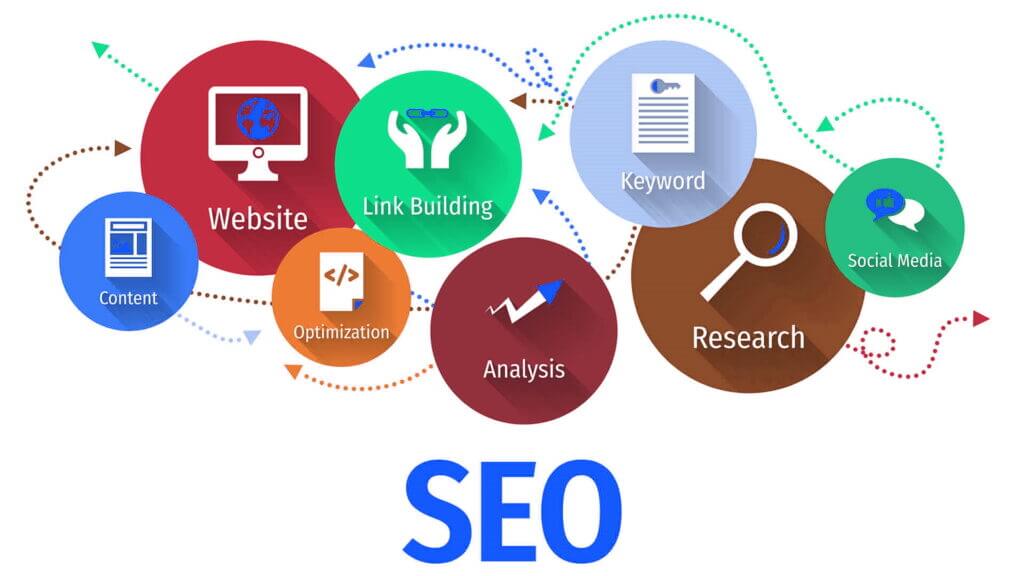Search Engine Ranking Factors for 2025: A Survey of 500 SEO Experts
Table of Contents
Top Search Engine Ranking Factors for 2025: Exclusive Insights from 500 SEO Experts
Key Findings Summary
Based on expert consensus, search engines in 2025 prioritize user experience and content quality above all traditional ranking signals. This report compiles insights from leading SEO professionals about the most impactful ranking factors.

As the digital landscape evolves, understanding the key search engine ranking factors becomes essential for businesses aiming to optimize their online visibility. With 500 SEO experts surveyed, we delve into the most important Google ranking factors for 2025 and explore how emerging trends will shape SEO strategies. This article offers a comprehensive overview of what to expect and how to prepare for the changes ahead.
Search Engine Optimization (SEO) Marketing
Client:
ANJ Plumbing - Anjservices.com
Category:
Digital Marketing
Start Date:
10 March, 2021
End Date:
Still Growing
Keywords Growth
+475% Top 10 Keyword Rankings
Leads growth
+266% Monthly Lead Growth
Conversion
+346% Conversion increase
Live Chat
+120% Live Chat Request increase
Core Ranking Factors by Impact
| Rank | Factor | Impact Score (0-100) | Change from 2024 |
|---|---|---|---|
| 1 | User Intent Match | 95 | ↑ 15 |
| 2 | Content Depth & Expertise | 92 | ↑ 10 |
| 3 | Mobile Experience | 90 | ↑ 5 |
| 4 | Page Speed | 88 | ↑ 8 |
| 5 | E-E-A-T Signals | 85 | ↑ 12 |
Content Quality Metrics
| Metric | Importance Rating | Key Requirements |
|---|---|---|
| Topic Coverage | Very High | Complete answers to user questions |
| Content Freshness | High | Regular updates for time-sensitive topics |
| Original Research | High | Unique data, studies, or insights |
| Multimedia Usage | Medium-High | Relevant images, videos, and infographics |
Technical Requirements for 2025
| Requirement | Target Metric | Priority Level |
|---|---|---|
| Core Web Vitals | All metrics in "Good" range | Critical |
| Mobile Load Time | Under 2 seconds | Critical |
| HTTPS Security | Required with current protocols | Essential |
| Site Architecture | Clean, logical structure | High |
User Experience Factors
Interaction Metrics
- Dwell Time: 3+ minutes for long-form content
- Bounce Rate: Below 40% for key pages
- Page Depth: 2+ pages per session
Engagement Signals
- Comments and discussions
- Social shares
- Time spent on page
- Click-through rates from search
AI and Search in 2025
Key Developments:
- AI content detection is more sophisticated
- Human editing and expertise matter more
- Mixed content (AI-assisted + human expertise) performs best
- Original research and first-hand experience are highly valued
Action Items for SEO Success
1. Content Strategy
- Create comprehensive topic clusters
- Update content quarterly
- Include expert quotes and citations
- Add original data when possible
2. Technical Focus
- Monthly Core Web Vitals checks
- Regular mobile usability testing
- Security protocol updates
- Site speed optimization
3. User Experience
- Clear site navigation
- Strong internal linking
- Fast load times
- Mobile-first design
Expert Tips
"Focus on solving user problems completely. Search engines now understand user satisfaction better than ever."
"Technical SEO is the foundation, but content quality and user experience drive rankings."
"Mobile experience isn't optional - it's the primary ranking factor for most searches."
Methodology Note
This report combines survey data from 500 SEO experts, including agency leaders, in-house SEO directors, and independent consultants. Data collected in late 2024 and early 2025.

How will search intent impact rankings in 2025?
In 2025, search intent will play a pivotal role in determining search engine rankings. As search engines like Google become increasingly sophisticated, understanding user intent behind search queries will be critical. SEO experts emphasize that aligning content with search intent not only helps Google to deliver relevant results but also enhances user experience. This shift reflects a move towards a more nuanced understanding of what users are truly looking for, beyond mere keyword matching. Consequently, businesses must focus on creating content that anticipates and satisfies user needs, ensuring that their websites remain visible in search engine results.
Which technical SEO factors will be crucial for Google rankings?
Technical SEO factors are expected to be more significant than ever in 2025. Page speed, mobile-friendliness, and secure connections are likely to be among the top technical considerations. These elements are crucial as they directly impact user experience, which Google increasingly prioritizes as an important ranking factor. Faster loading times and responsive designs help websites rank higher in Google search results by ensuring that users can access content quickly and efficiently. Additionally, as privacy concerns grow, secure websites will likely be favored by Google's ranking algorithm, reinforcing the importance of technical optimization in SEO strategies.
What on-page SEO elements will matter most in 2025?
On-page SEO will continue to be a cornerstone of effective SEO strategies in 2025. SEO experts highlight the importance of high-quality, relevant content, optimized meta tags, and the strategic use of keywords as critical on-page elements. These factors contribute to how search engines interpret the relevance and quality of web pages, ultimately affecting their ranking on Google. As the algorithm evolves, the emphasis will be on creating content that not only meets SEO best practices but also engages and retains users. Businesses should focus on delivering value through their content, ensuring that it aligns with the search intent and meets the needs of their target audience.
How will Google's algorithm evolve by 2025?
The evolution of Google's algorithm by 2025 is anticipated to reflect a more sophisticated understanding of user intent and context. Enhanced machine learning capabilities will likely enable the algorithm to process natural language queries with greater precision, facilitating a more intuitive search experience. Furthermore, the integration of artificial intelligence will drive advancements in personalized content delivery, ensuring that users receive highly relevant results tailored to their individual preferences. As a result, the emphasis on quality content and user engagement metrics will become increasingly paramount in determining search rankings.
What new ranking signals might Google introduce?
By 2025, Google may introduce new ranking signals that reflect emerging technologies and user behaviors. As the digital landscape shifts, factors such as user engagement metrics, content freshness, and the use of multimedia could gain prominence. SEO experts speculate that Google will continue to refine its ranking algorithm to better evaluate the quality and relevance of content. This evolution will likely include a greater emphasis on the authenticity and authority of information, with signals to Google that prioritize trustworthiness and expertise in content. Staying abreast of these developments will be crucial for businesses aiming to maintain or improve their visibility in search engine results.
How will AI and machine learning affect SEO strategies?
The integration of AI and machine learning into Google’s algorithm will greatly influence SEO strategies by 2025. These technologies enable more personalized and accurate search results, as they learn from vast amounts of data to predict user preferences. SEO experts anticipate that AI will help Google better understand complex search queries and user intent, leading to more nuanced search results. As a result, businesses will need to leverage AI tools to analyze search patterns and tailor their content accordingly. The use of machine learning in SEO will also enhance the ability to predict trends and optimize content strategies to align with evolving search behaviors.
What traditional ranking factors may lose importance?
As Google's algorithm evolves, certain traditional ranking factors might lose their significance by 2025. SEO experts suggest that factors such as keyword density and exact match domains may become less effective as Google prioritizes content quality and user experience over simplistic SEO tactics. Instead, the focus will likely shift towards more advanced techniques that incorporate user-centric metrics and engagement levels. This shift reflects Google's ongoing efforts to deliver the most relevant and high-quality results to users. Therefore, businesses will need to adapt their SEO strategies to emphasize content depth, originality, and user satisfaction over outdated practices.
What SEO trends will dominate in 2025?
As we look towards 2025, several key trends are poised to give Google a competitive edge in the realm of search engine optimization. The integration of artificial intelligence and machine learning will enhance personalized search experiences, allowing users to receive more relevant results. Additionally, the growing emphasis on voice search optimization will compel content creators to adapt their strategies accordingly. Furthermore, the significance of user experience and site performance will continue to rise, reinforcing the necessity for website owners to prioritize these elements to maintain visibility in search results.
How will user experience impact search engine rankings?
User experience will be a dominant factor influencing search engine rankings in 2025. Google's continued focus on user satisfaction means that aspects such as site navigation, content accessibility, and overall usability will be crucial. SEO experts stress the importance of designing websites that offer seamless and intuitive experiences, as these factors are increasingly used as signals to Google about a site's quality. Enhanced user experience not only aids in ranking higher in Google search results but also boosts engagement and retention rates. Therefore, optimizing for user experience will be integral to effective SEO efforts, ensuring that websites meet the expectations of both users and search engines.
What role will voice search play in SEO?
Voice search is expected to play a significant role in shaping SEO strategies by 2025. As more people use voice-activated devices, the nature of search queries is shifting from traditional text to conversational language. SEO experts predict that optimizing for voice search will require a focus on natural language processing and long-tail keywords that mirror how people search verbally. This trend necessitates a rethinking of content strategies to ensure that websites can effectively capture voice search traffic. Businesses will need to consider how voice search affects search volume and adjust their optimization tactics to cater to this growing segment of search engine users.
How will mobile-first indexing evolve?
Mobile-first indexing will continue to evolve and solidify its importance in SEO strategies by 2025. As the majority of users access the internet via mobile devices, Google prefers websites that offer a mobile-friendly experience. SEO experts emphasize the need for responsive designs and fast loading times, as these factors significantly impact visibility in search engine results. The shift towards mobile-first indexing means that businesses must prioritize mobile optimization to ensure their websites are ranking effectively. This evolution highlights the ongoing trend of prioritizing user experience, especially for mobile users, as a critical component of SEO success.
How to achieve first page rankings in 2025?
Achieving first-page rankings in 2025 necessitates a comprehensive understanding of how Google and Bing operate within the SEO world. It is essential to implement effective SEO practices that consider various factors like user engagement and content relevance. Google favors websites that enhance visibility in search results by aligning with how users interact with search engines.
In this context, it is important to focus on direct SEO strategies, as Google pays attention to the quality of content and user experience. Furthermore, utilizing Google Analytics tips can provide valuable insights into users and search engines value. There is no doubt that Google can bring significant traffic to well-optimized sites, while Google also recognizes the importance of mobile-friendliness and page speed in ranking algorithms.
What content strategies will help websites rank higher in Google search results?
To achieve first page rankings in 2025, content strategies must focus on quality, relevance, and user engagement. SEO experts recommend creating comprehensive and authoritative content that addresses user search intent effectively. This involves conducting thorough keyword research to understand what users are searching for and crafting content that provides valuable insights. Additionally, incorporating multimedia elements such as videos and infographics can enhance content appeal and engagement. By prioritizing content that resonates with users and meets Google’s evolving standards, businesses can improve their chances of ranking higher in Google search results and increasing their visibility in search engine outcomes.
How can businesses improve their visibility in search engine results pages?
Improving visibility in search engine results pages requires a multifaceted approach that combines technical, on-page, and off-page SEO strategies. SEO experts advise focusing on optimizing website performance, including page speed, mobile-friendliness, and secure connections, as these factors significantly influence rankings. Additionally, businesses should engage in effective link building practices to establish authority and credibility. Creating high-quality content that aligns with user needs and search intent is also crucial for visibility. By integrating these strategies, businesses can enhance their presence on search engine results pages and achieve a competitive edge in the digital marketplace.
What link building techniques will be effective in 2025?
Link building remains a vital component of SEO, and by 2025, certain techniques will prove essential for success. SEO experts highlight the importance of earning high-quality backlinks from reputable websites to establish authority and trustworthiness. This involves creating compelling content that naturally attracts links and engaging in collaborative partnerships for guest blogging and co-marketing. Additionally, as Google’s algorithm becomes more sophisticated, the focus will shift towards the quality rather than the quantity of backlinks. Businesses should prioritize building genuine relationships within their industry to foster link opportunities and enhance their website’s ranking on the first page of search results.
What tools will be essential for SEO success in 2025?
In 2025, the landscape of search engine optimization (SEO) will continue to evolve, necessitating the use of advanced tools to enhance a site’s google rankings. As google payseffective SEO practice that aligns with well-known ranking factors. Furthermore, with the rise of SEO for ecommerce, strategies must be tailored to improve first page google rankings, while also mitigating risks associated with negative SEO.
As 2024 google updates roll out, it is essential to recognize that SEO isn’t merely about keyword optimization; rather, it encompasses a holistic approach that considers factors likegoogle favors.
How will Google Search Console evolve to support SEO efforts?
Google Search Console is expected to evolve significantly by 2025, providing more advanced insights and tools to support SEO efforts. SEO experts anticipate enhancements in data analytics and reporting features, enabling businesses to gain deeper insights into their website performance and search visibility. The integration of AI and machine learning within Google Search Console may offer predictive analytics, helping businesses identify potential SEO opportunities and threats. As a result, staying updated with these developments will be crucial for businesses aiming to optimize their SEO strategies and maintain competitive rankings in search engine results.
What new SEO tools might emerge to address 2025 ranking factors?
As SEO evolves, new tools are likely to emerge by 2025 to address the changing landscape of ranking factors. SEO experts predict the development of tools that leverage AI and machine learning to provide advanced keyword research, content optimization, and competitor analysis. These tools will be designed to handle the complexities of modern SEO, offering automated insights and recommendations to enhance SEO strategies. Additionally, tools focusing on user experience metrics and engagement analytics may become more prevalent, helping businesses optimize their websites for improved rankings and visibility. Embracing these innovations will be key to achieving SEO success in 2025.
How will Google Analytics integrate with SEO strategies?
Google Analytics will play an increasingly integral role in shaping SEO strategies by 2025. The platform is expected to offer more sophisticated analytics capabilities, providing businesses with comprehensive insights into user behavior and engagement. SEO experts emphasize the importance of leveraging Google Analytics to track key performance indicators, such as bounce rates, session duration, and conversion rates. This data can inform SEO strategies, enabling businesses to optimize their content and website performance to meet user expectations. By effectively integrating Google Analytics into their SEO efforts, businesses can enhance their understanding of search trends and improve their rankings in Google search results.

How will local SEO change by 2025?
By 2025, local SEO is anticipated to evolve significantly, influenced by advancements in the Google algorithm. As businesses strive to enhance their online presence, understanding the SEO ranking factors will be crucial for success. Experts predict that the 10 most important factors will shift, adapting to user behavior and technological developments. Google may prioritize one SEO approach, integrating local search with overall strategies for effective SEO. With over 200 ranking factors at play, achieving improved ranking on Google will remain an essential part of SEO initiatives.
What factors will influence local search rankings?
Local SEO is expected to undergo significant changes by 2025, with various factors influencing rankings. SEO experts highlight the importance of optimizing for location-based keywords and ensuring accurate business information across online directories. Google My Business listings will play a critical role, as they provide essential information for local searches. Additionally, user reviews and ratings will become increasingly influential, serving as important ranking signals. Businesses must prioritize building a positive online reputation and engaging with local communities to enhance their local search visibility. This approach will help businesses maintain a competitive edge in the evolving landscape of local SEO.
How will Google My Business evolve to impact local SEO?
Google My Business (GMB) is anticipated to evolve significantly by 2025, impacting local SEO strategies. SEO experts predict enhancements in GMB features, offering more interactive and personalized experiences for users. These may include advanced analytics to track user interactions and insights into local search trends. As GMB becomes more integral to local SEO, businesses must ensure their profiles are complete, accurate, and regularly updated. Engaging actively with customer reviews and leveraging GMB’s tools will be crucial for maintaining visibility in local search results. By adapting to these changes, businesses can strengthen their local SEO efforts and attract more local customers.
What challenges will SEO face in 2025?
In 2025, the landscape of search engine optimization (SEO) will face significant challenges as it adapts to evolving user behaviors and technological advancements. One of the critical aspects will be the emphasis on page speed and page loading times, which are becoming increasingly important as Google’s search algorithm prioritizes important ranking factors that enhance user experience. As Google measures search volume and user’s search intent, websites that are ranking must ensure optimal performance to maintain their positions in Google’s search results.
Furthermore, SEO professionals will need to focus on understanding the ranking algorithm that Google used to determine important ranking positions. With over 200 ranking factors influencing outcomes, staying updated on the 10 most important SEO ranking factors will be imperative. As Google gives preference to authoritative pages, it is essential for SEO companies, such as SEO company Moz, to develop strategies that align with Google’s search expectations and adapt to changes in Google’s search algorithm.
Moreover, as engines like Bing continue to evolve, competition for organic search traffic will intensify. SEO in 2025 will necessitate a thorough understanding of using Google trends to anticipate shifts in search terms that resonate with users. By effectively signaling to Google the relevance of their content, websites can better position themselves within the SEO landscape, ensuring sustained visibility and engagement in an increasingly complex digital environment.
How will increased competition affect ranking strategies?
The increasing competition in the digital space will pose significant challenges for SEO strategies by 2025. As more businesses recognize the importance of SEO, achieving and maintaining high rankings will become more competitive. SEO experts advise focusing on niche markets and differentiating content to stand out from competitors. Additionally, businesses must continuously innovate their SEO tactics to adapt to algorithm updates and changing user preferences. By staying ahead of the competition and leveraging unique value propositions, businesses can enhance their ranking strategies and secure a prominent position in search engine results.
What potential algorithm updates might disrupt SEO practices?
Potential algorithm updates from Google could disrupt traditional SEO practices by 2025, requiring businesses to adapt quickly. SEO experts anticipate that updates may focus on refining user experience metrics and enhancing content quality assessments. These changes could render certain outdated SEO tactics ineffective, necessitating a shift towards more holistic and user-centric strategies. Staying informed about algorithm updates and understanding their implications will be crucial for businesses aiming to maintain their rankings. By proactively adjusting their SEO practices in response to algorithm changes, businesses can mitigate disruptions and continue to achieve competitive search engine visibility.
How will privacy concerns impact SEO techniques?
Privacy concerns are expected to have a substantial impact on SEO techniques by 2025, influencing how businesses collect and use data. As regulations become stricter, SEO experts emphasize the importance of transparency and compliance in data practices. This shift may affect the availability of certain data used for targeted marketing and personalization, requiring businesses to find alternative ways to engage users. Focusing on building trust and providing value through content will be essential for maintaining user engagement and search engine rankings. By prioritizing privacy and ethical data practices, businesses can navigate these challenges and sustain successful SEO efforts.




